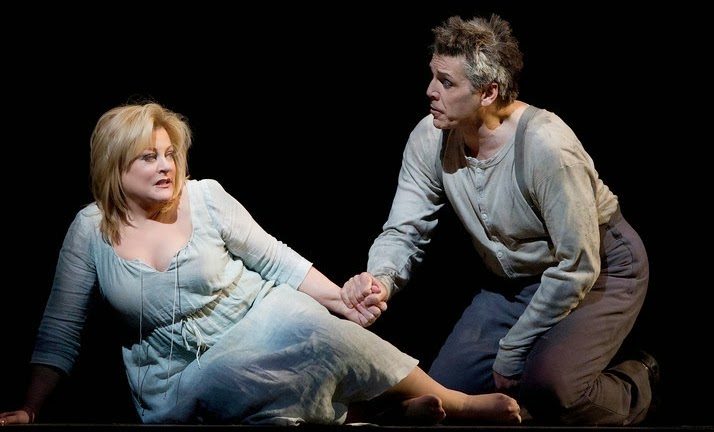Hampson is a moving Wozzeck in belated role debut

Thomas Hampson in the title role and Deborah Voigt as Marie in Berg’s “Wozzeck” at the Metropolitan Opera.
Thursday night, one week after Matthias Goerne’s remarkable performance as Wozzeck as an impromptu fill-in for an ailing Thomas Hampson, Hampson himself took the stage at the Metropolitan Opera House for his debut as the lead in Alban Berg’s great opera.
Hampson is one of the true leading men of the opera and lieder stages, and his dashing, virile good looks and vocal artistry have made him ideal for such roles as Rodrigo in Don Carlo and Valmont in Conrad Susa’s Dangerous Liaisons. One would think he’d be dramatically miscast as the poor, dumb, probably mad soldier who murders his lover and then drowns while trying to hide the knife.
Except that he turned out to be a great Wozzeck, vastly different in characterization and style than his colleague but equally as accomplished. With Goerne on opening night, the opera had tremendous force, but with Hampson in the lead, the overall production was even more expressive and affecting in every way.
The production had been prepared and staged with and around Hampson, and though there were few moments where the action on stage was notably different than opening night, the accumulation of small details in blocking and movement added up to a more fluid and natural feel for the acting. Perhaps the other performers felt they had less to fill in with Hampson in their midst.
Yet he was quieter on stage than Goerne, who was riveting as he moved around like a weird Jacques Tati. Hampson is taller than anyone in the cast, including tenor Simon O’Neill as the Drum Major, and that allowed him to be dominated by the other characters—as the libretto demands—while still holding a central presence. This made the condescension and taunts from the Captain (tenor Peter Hoare) and the Doctor (bass Clive Bayley) more vivid, the fight with the Drum Major more emasculating.
Hampson sang beautifully, the only trace of the bronchitis he had being some lack of power in his low register. There’s a sincere humanity to his voice, even a touch of boyishness, that was surprisingly effective in the role. His Wozzeck is not an üntermensch but an everyman, but worse off and with no hope. Everyone, even Marie, takes something from him, and when he slits her throat it’s much more the existential act of a man who is disintegrating than insanity.
His acting is excellent, but Hampson makes the characterization work with his voice. His sprechstimme passages are the key: he delivers them plainly and with a touch of rubato, and they are convincingly dramatic and real in what they show us about Wozzeck. At the end, drowning in the pond, Goerne reveled in the blood in the water, the red of the moon. Hampson’s Wozzeck was simply terrified.
With the seasoning of a few performances and the opening night adrenaline gone, the entire cast was improved. Deborah Voigt, in the soprano role of Marie, was far better, fully inside the character, vital in every moment. Hoare and Bayley were visibly and audibly more relaxed, and more vivid and impressive than on opening night.
The orchestra was also improved, the brass fully secure, conductor James Levine more flexible with tempos and dynamics. The details, which are everything in this masterful score, were there, with more colors. In the final act, the crescendos in the Invention on a Chord proved even more hair-raising then those from the Vienna State Opera at Carnegie Hall last month, and the symphonic tone poem that precedes the final scene was beautifully played and emotionally powerful. In this music, Berg sought to break from the objective manner of the rest of the drama and touch the listener with the tragedy they were witnessing. This deeply affecting performance did just that.
Wozzeck runs through concludes March 22. metoperafamily.org